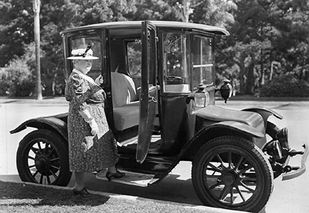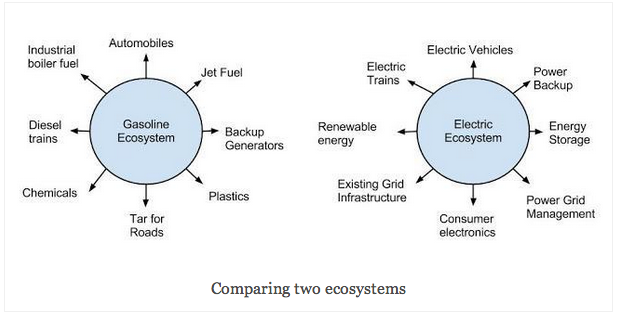Let me explain what I mean by the gasoline ecosystem. Crude oil is pumped from the oil wells and then refined to produce gasoline, diesel, jet fuel, plastics, solvents, lubricants and tar. These multiple products are made from a single raw material. All these products are sold in high volumes and due to high volumes, petroleum refineries manage a near perfect (100%) efficiency. The investment required to set up oil wells, refineries and transport infrastructure is shared by 1000s of products derived from the crude oil. So when you look at the gasoline prices, it has a huge advantage of cost sharing with all other products. Now, as the gasoline was cheaper and more energy denser than batteries that store the electricity, gasoline ecosystem won the race in the transportation sector.
 The Electric Baker was ideal as a city car
The Electric Baker was ideal as a city car
During this boom of the gasoline economy, one thing remained surprisingly constant and that is our source of electricity. Even though gasoline became cheaper and improved in efficiency, the internal combustion engine still could not match the efficiency of turbines in thermal power plants. Coal fired power plants are still more efficient than gasoline generators and have provided cheap electricity over past many decades. Cheap coal was hard to replace by gasoline as coal needs no refining or purification, it can be mined and directly used as a fuel.
Now we are again at an interesting juncture in the history of the mankind. Electric vehicles with advanced battery technology are challenging the gasoline economy. People against electric vehicles may point out the cost and range as major hurdles in the mass adoption, but they cannot deny the fact that the efficiency of the electric motor (95%) will give an internal combustion engine (30% efficiency) a run for the money.
Now the next major challenge for electric vehicle makers is the cost. Interestingly, we can learn a lot from the rise of the gasoline economy. The strength of the gasoline economy was not only the energy density and convenience of the system, but also a range of products supporting the system. To make electric vehicles successful, we can reapply the same principle to batteries (fuel storage for EVs)
We have to make Electric vehicle part of the electric ecosystem. The war is not between who powers your car, but war is between who can deliver the usable energy at the cheapest and most convenient way to the end user. The diagram below shows how the ecosystem supports various applications. Each application provides additional volume and advantage to the overall ecosystem. The base of the gasoline ecosystem is crude oil and base of new emerging ecosystem is battery system and power electronics.
This is a very good cycle, which will be able to challenge the current gasoline ecosystem. Electric vehicles or any other new technology can win only if the whole ecosystem wins. The hydrogen fuel cell ecosystem is another ecosystem that can challenge the gasoline ecosystem, but again to win the war, hydrogen fuel cell has to challenge the whole ecosystem and not succeed only in niche applications.
I am convinced that the electric ecosystem will have the last laugh. The transition will be a slow, gradual process and we will be able to see it pan out over next few decades. Although the issues of global warming will drive the change, the cost of the system remains the ultimate tipping point. By no means I am discrediting the gasoline ecosystem, it has contributed tremendously in the development of mankind, but we need the electric ecosystem to take the next step.

